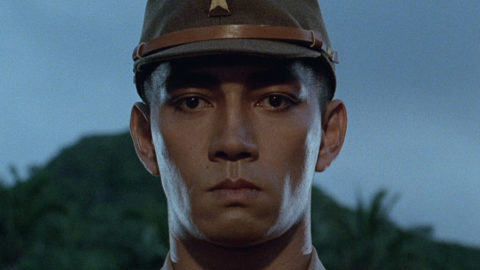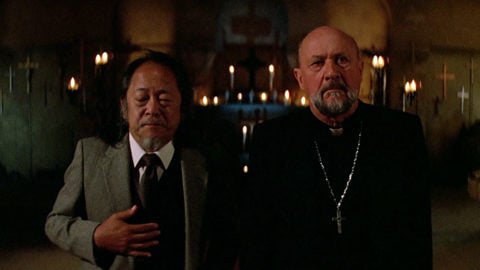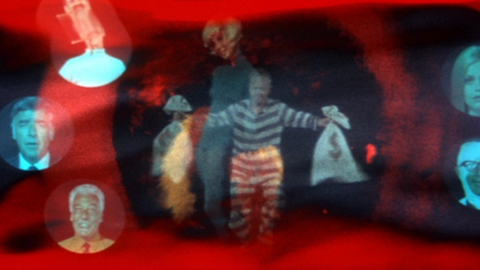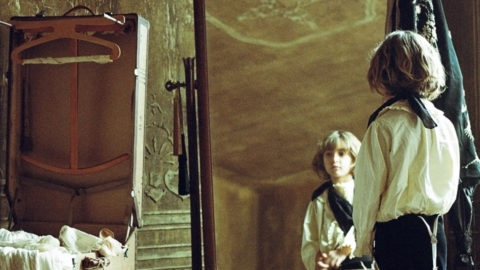Deep Cuts: Stewart Copeland
Some reading music: listen to this week’s special mix below. (See the full track listing.)
The early 1980s was a fertile period for soundtracks, ushering in a new breed of composers with backgrounds in electronic music, pop, progressive rock, new wave and post-punk. Stewart Copeland, the drummer for the Police (and son of a CIA agent) is one such composer, although he wasn’t the first. Vangelis Papathanassiou of the band Aphrodite’s Child began composing for film as early as the 1960s, although he didn’t break into the mainstream until 1982 with his soundtrack for Ridley Scott’s Blade Runner. Danny Elfman, of Oingo Boingo, scored his brother Richard’s 1980 film The Forbidden Zone, but he first gained fame in 1985, with his soundtrack for Tim Burton’s Pee Wee’s Big Adventure. And Ryuichi Sakamoto, of the band Yellow Magic Orchestra, began his soundtrack career in 1983, with his score for Merry Christmas, Mr. Lawrence. Copeland appeared on the scene around the same time, scoring Francis Ford Coppola’s Rumble Fish in 1983 while he was still recording and touring with the Police. The band broke up in 1986 and Copeland continued to compose soundtracks for over 20 years, working with directors like Arthur Hiller, Ken Loach, Oliver Stone, John Hughes, and John Waters.
https://www.youtube.com/watch?v=wz61mHf9Tac
Coppola first approached Copeland about scoring Rumble Fish at the behest of his sons, who were fans of the Police. Copeland had no experience composing soundtracks, so he was left to improvise his own method, along with his collaborator Jeff Seitz. Recorded at the Long Branch Studio in Tulsa, Oklahoma, where the film was shot, the soundtrack acts as a ticking clock, creating a sense of what Copeland referred to as “impending, implacable doom.” Playing a host of instruments including the marimba, banjo, guitar, bass, kazoo and piano, Copeland worked to personify the lead character Rusty James and his brother, the edgy (and effectively doomed) Motorcycle Boy. Copeland worked extensively with samples, creating a sound bank of barking dogs, pile drivers, billiard balls clacking, and cars crashing, cut and taped into short loops. Later he recorded orchestral music at Paramount studios in California, adding strings where needed. Some of the compositions are syncopated and upbeat, not unlike many songs by the Police, irresistibly hip and catchy. Lurching strings add a dose of unease to certain scenes, like when the Motorcycle Boy is confronted by his drugged-up lady friend, Cassandra. A debauched party scene, full of sweaty, twisting bodies is accompanied by a dissonant tune that underlines the problem with this picture: there is Rusty James, writhing on a couch with a topless girl, drunk out of his mind, even though he’d promised to take his girlfriend Patti on a date.
“Don’t Box Me In” is the soundtrack’s takeaway pop song, a collaboration with vocalist Stan Ridgway. It’s a peppy number that rides on clock-ticking drums, syncopated guitar and a simple harmonica melody.
Copeland worked with Ridgway again in 1998 on the Pecker soundtrack, on the song “Don’t Drop the Soap (For Anyone Else But Me)” with lyrics written by John Waters, sung by Ridgway, and music by Copeland. “Don’t Box Me In” was released as a single, and the music video was played often on MTV. Copeland’s soundtrack for Rumble Fish was also celebrated, and nominated for a Golden Globe—not bad for a first try.
Copeland’s next film project was the score for Out of Bounds (1986), directed by Richard Tuggle, whose only other directing credit is the sleazy Clint Eastwood vehicle Tight Rope (1984). Anthony Michael Hall plays a naive, knife-wielding yokel from Iowa who accidentally picks up the wrong bag at LAX and winds up carrying a million dollars worth of heroin. What follows is a mess of ridiculous action in a distinctively ’80s setting with pop culture cameos ranging from Siouxsie and the Banshees to Meatloaf. Copeland’s serviceable score is largely percussive, amping up the action with synthesizers and plucky electric guitar.
In the late ’80s Copeland scored two films for Oliver Stone, both of which explored the dark side of human nature. Copeland’s score for Wall Street (1987) is hard-hitting, with loud, tinny drums and fluttery keyboards. Elsewhere the sound of snarling, barking dogs leads into an aggressive track mimicking the speedy jittery tension that stifles the Wall Street cubicles. Talk Radio (1988), in which Eric Bogosian’s controversial radio personality is harassed by anonymous callers, is equally taut if not toned down, less abrasive though just as nervous, with swift drumming and synthesizers giving voice to an underlying menace.
Copeland scored a few films for Loach during the early 1990s, among them Riff-Raff (1991) and Raining Stones (1993), two films with a similar tone. Riff-Raff could be considered Loach’s first black comedy, starring Robert Carlyle and Emer McCourt as a laborer and an aspiring singer struggling to make ends meet. It opens with a bluesy piano tune befitting the film’s bittersweet sense of humor. Other melodies are more playful or serious, depending on the accompanying scene, but are always spare with little to no synthesized chords. Released two years later and sharing much of the same cast as Riff-Raff, Raining Stones depicts a father who resorts to questionable odd jobs in order to buy a communion dress for his daughter. The synthesizer-driven soundtrack is punchy but relatively muted, providing gentle support for the action onscreen.
Copeland’s soundtracks are generally more talkative than other synthesized scores of the 1980s that linger on sustained chords or imitate old-fashioned string arrangements. His music resembles only the most unique of his contemporaries, namely Danny Elfman at his sprightly best. Surely his experience as the drummer for one of the biggest bands in the world influenced his composing style, perhaps adding to its overall poppiness. The 1990s saw Copeland expanding his instrumentation and experimenting with different sounds. In some cases this meant a return to the full drum kit, the guitar, and traditional rock instrumentation while in others, an expansion of strings in combination with acoustic and synthesized music. During this time he did scores for Boaz Yakin’s Fresh (1994), Vondie Curtis-Hall’s Gridlock’d (1997), and Pecker (1998), to name a few. Copeland became a prolific composer for hire throughout the rest of the decade and into the 2000s, but his main focus became commissioned work for ballet and opera. Copeland retired from soundtrack work around 2006 and in 2011, started a YouTube channel archive of jam sessions at his home studio, the “Sacred Grove,” joined by a coterie of musicians from Snoop Dog to Primus. And in 2016, he composed a live score to Fred Niblo’s 1925 Ben Hur: A Tale of the Christ that was performed by a full orchestra (plus electric guitar) with Copeland on drums. Gone are the days of plugging samples into a Fairlight synthesizer and recording to two-inch tape. But the soundtrack to Rumble Fish remains a vibrant reminder of that time, as well as a gem of a find for any fan jonesing for echoes of the Police.
Rumble Fish is available on Blu-ray from the Criterion Collection.
Track List:
1. “Don’t Box Me In” (with Stan Ridgway) – Rumble Fish
2. “Childhood Friends” – The Leopard Son
3. “Biff Gets Stomped By Rusty James” – Rumble Fish
4. “The Equalizer Busy Equalizing” – The Equalizer
5. “Vinnie Arrives Party” – Simpatico
6. “Our Mother Is Alive” – Rumble Fish
7. “We Know Where You Live” – Talk Radio
8. “Mud Lions” – The Leopard Son
9. “Thrift Shop Fashion Shoot” – Pecker
10. “Brothers on Wheels” – Rumble Fish
11. “Bud’s Scam” – Wall Street
12. “Run/Esteban/Posse” – Fresh
13. “MeMaMa” – Pecker
Margaret Barton-Fumo is the editor of Paul Verhoeven: Interviews (University Press of Mississippi) and a longtime contributor to Film Comment.







